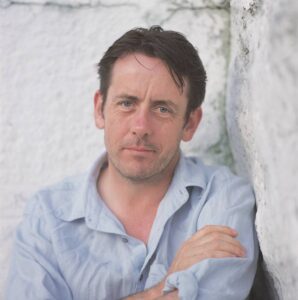 By Jae-Ha Kim
By Jae-Ha Kim
Chicago Sun-Times
April 6, 1992
There is such strength and purity to Luka Bloom’s music that a band could only diminish the conviction of his songs. Standing alone on a barren stage at the Park West Friday night with just his electro-acoustic guitar for accompaniment, Bloom gave a sly but powerful performance that ended all too soon.
Bloom is a child of folk music who understands the rhetoric of rock ‘n’ roll. The frenetic guitar playing on “The Acoustic Motorbike,” which he sang for his first encore, is as vibrant as anything the Pogues ever came up with. His lilting vocal delivery of “Gone to Pablo,” a graceful, mournful song about the suicide of Picasso’s widow, matches Suzanne Vega breath by breath.
The Irish musician also is an original artist who makes covers all his own. By adding syncopated rhythms and distanced passion to “Can’t Help Falling in Love,” he gave new life to Elvis Presley’s decades-old song. Likewise, his version of LL Cool J’s “I Need Love” was almost unrecognizable from the rapper’s version.
As his brogue gently rolled the syllables together, Bloom drew out the romanticism of the lyrics that sounded cynical when LL rapped them: “I watch the sunrise in your eyes/So in love when we hug we feel paralyzed/Our bodies explode in ecstasy unreal/You’re as soft as a pillow, I’m as hard as steel.”
When members of the audience starting clapping along, Bloom’s rapier wit surfaced. “Listen, if I wanted a drummer, I would’ve brought Ginger Baker along,” he said, good-naturedly.
Bloom’s synthesis of rap’s lyrics and folk’s melody surfaced again on “Bridge of Sorrow.” There is a churning urgency to the provocative number that showed his flirtation with rap was well-founded.
There has come to be an expectation from Irish musicians to wear their socio-political beliefs on their sleeves, but Bloom refuses to conform. His liberal views are sprinkled through his albums “Riverside” and “The Acoustic Motorbike,” but it’s the listener’s job to find them.
Much of Bloom’s material projects heartbreaking melancholy and longing. He is among a handful of artists who can capture the enthusiastic spirit of his live shows on record, and who also can translate the pristine studio techniques in concert. Onstage, Bloom is louder and funnier than on his moody albums.
“I hate this place,” Bloom dead-panned, looking out into the standing room-only crowd early in the hour and 40-minute show. “It’s so ugly in here.”
Backstage, Bloom explained he and his road crew have gotten into the habit of saying exactly the opposite of how they feel.
In that case, we hate you, too. Don’t ever come back.